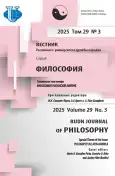A.L. Sakketti’s Historism and the Problem of the People
- Авторлар: Zagirnyak M.Y.1, Roschepkina M.A.1
-
Мекемелер:
- Immanuel Kant Baltic Federal University
- Шығарылым: Том 29, № 3 (2025): PHILOSOPHY IN LATIN AMERICA
- Беттер: 845-859
- Бөлім: HISTORY OF PHILOSOPHY
- URL: https://journal-vniispk.ru/2313-2302/article/view/325478
- DOI: https://doi.org/10.22363/2313-2302-2025-29-3-845-859
- EDN: https://elibrary.ru/EDTOND
- ID: 325478
Дәйексөз келтіру
Толық мәтін
Аннотация
The philosophy of Alexandr L. Sakketti (Saссhetti, 1881-1966) is still an understudied area. Researchers pay attention to his publication devoted to understanding the philosophy of law from the perspective of Marburg neo-Kantianism and to his translation works. Sakketti’s socio-philosophical ideas are beyond the scope of all studies. In this research we analyze Sakketti’s ideas concerning sociocultural development. Supporting G. Simmel’s view of society as a set of interactions of many people, Sakketti viewed law not only as a tool for ensuring social order, but also as a necessary requirement for the creation of society. Through law a society is formed, and through the state it gains unity and becomes a collective social subject - the people. It was found out that the people is a collective social subject formed in the interaction between the folk (natural features of the social community) and the state (normative prescriptions of the social order). It is the people that plays a key role in socio-cultural development. It has been determined that determined that Sakketti proposed his own interpretation of the process of development of society and culture, distinguishing its three stages: natural, legal and moral. At the legal stage, the people are formed, and at the moral stage, they create culture. It was defined that he distinguished law and morality using the formula of minimum of morality. It is revealed that Sakketti proposed a new interpretation of law as a minimum of morality, different from the variants of G. Jellinek and V.S. Solov’ev. Morality evolves under the conditions of law: law allows a person to move from the natural state of existence to social being, to create social relations, the development and ramification of which will take place already at the stage of morality. Culture as a result of collective experience is formed in the moral interactions of a multitude of individuals. As a result, it is shown that Sakketti, thanks to his unique interpretation of the social role of law, was able to avoid sociological nominalism and universalism and to justify historism: to consider the development of society as a process of formation of culture, which is possible as a product of collective efforts due to the free acting of a multitude of individuals who constitute the people.
Негізгі сөздер
Авторлар туралы
Mikhail Zagirnyak
Immanuel Kant Baltic Federal University
Хат алмасуға жауапты Автор.
Email: MZagirnyak@kantiana.ru
ORCID iD: 0000-0003-4024-0044
SPIN-код: 3437-7747
PhD, Leading Research Fellow, Institute of Education and Humanities
14 A. Nevskogo St., Kaliningrad, 236041, Russian FederationMaria Roschepkina
Immanuel Kant Baltic Federal University
Email: MARoschepkina@kantiana.ru
ORCID iD: 0009-0003-9814-7683
Junior Research Fellow, Institute of Education and Humanities
14 A. Nevskogo St., Kaliningrad, 236041, Russian FederationӘдебиет тізімі
- Blum H. V Columnae or description and Application of five orders. Moscow: Vsesoyuznaya akademia arkhitektury publ.; 1936. (In Russian).
- Anzilotti D. Corso di Diritto Internazionale. Vol. 1. Introduzione. Teoria generale. Moscow: Inostrannaya literatura publ.; 1961. (In Russian).
- Grotius H. De jure belli ac pacis. Moscow: Ladomir publ.; 1994. (In Russian).
- Belov VN. Reception of Cohen’s Ethics in Russia. Kantian Journal. 2014;4(50):98–110. (In Russian). https://doi.org/10.5922/0207-6918-2014-4-7 EDN: SJQVHB
- Belov VN. Novgorodtsev’s Neo-Kantianism: Novgorodtsev and Savalskiy Debate. Lex Russia. 2019;2(147):151–162 (In Russian). doi: 10.17803/1729-5920.2019.147.2.151-162 EDN: YZFRTN
- Semyonov VYe. Kant and Marburg School. RUDN Journal of Philosophy. 2023;27(3):541–555. (In Russian). https://doi.org/10.22363/2313-2302-2023-27-3-541-555 EDN: CPLSIE
- Nemeth T. Russian Neo-Kantianism. Emergence, Dissemination, and Dissolution. Berlin; Boston: Walter de Gruyter GmbH; 2022. https://doi.org/10.1515/9783110755404
- Sakketti AL. Philosophy of Hermann Cohen. Kantian Journal. 2021;40(2):95–130. https://doi.org/10.5922/0207-6918-2021-2-4 EDN: LAVTWW
- Savenko GV. Aleksandr Liverievich Sakketti. Proceedings of Higher Educational Institutions. Pravovedenie. 2002;5(244):232–241. (In Russian). EDN: TLCYXZ
- Smorchkov VK. The first Kostroma university: time, people, destinies. Kostroma: Nekrasov Kostroma State University publ.; 2013. (In Russian).
- Tonkov EN. Approaches to Understanding Law in The Early Soviet Period. Ivanovo State University Bulletin. Series Natural, Social Sciences. 2023;(3):18–24. (In Russian). EDN: DHDWZC
- Vorobyev MV. The problem of social violence in philosophy of the Russian Neo-Kantians. Philosophy and Culture. 2016;(8):1099–1106. (In Russian). doi: 10.7256/1999-2793.2016.8.20166 EDN: WZYYCH
- Kant I. Grundlegung zur Metaphysik der Sitten. In: Gulyga AV, editor. Works. In 8 volumes. Vol. 4. Moscow: Choro publ.; 1994. P. 153–246. (In Russian).
- Sakketti AL. Law and science of law. Yuridicheskii vestnik. 1916;16(4):5–37. (In Russian).
- Simmel G. Geselligkeit. In: Levit SY, editor. Simmel G. Selected. Problems of sociology. Moscow, Saint Petersburg: Universitetskaya kniga publ., Tsentr gumanitarnykh initsiativ publ.; 2015. P. 251–264. (In Russian).
- Simmel G. Über soziale Differenzierung Soziologische und psychologische Untersuchungen. In: Levit SY, editor. Simmel G. Selected. Problems of sociology. Moscow, Saint Petersburg: Universitetskaya kniga publ., Tsentr gumanitarnykh initsiativ publ.; 2015. P. 7–158. (In Russian)
- Sakketti AL. State and nationality. Yuridicheskii vestnik. 1915;12(4):5–16. (In Russian).
- Sakketti AL. Constituent Assembly and the Basic Laws of the State. Petrograd: Joint-stock company Muravei; 1917. (In Russian).
- Sakketti AL. Socialism and anarchism. Narodopravstvo. 1917;(6):7–8. (In Russian).
- Jellinek G. Die socialethische Bedeutung von Recht, Unrecht und Strafe. Moscow: Tovarishchestvo Pechatnya S.P. Yakovleva publ.; 1910 (In Russian).
- Schopenhauer A. Die Welt als Wille und Vorstellung. Vol. 1. Moscow: Akademicheskii Proekt publ.; 2019. (In Russian).
- Solov’ev VS. The Justification of the Good. Moscow: Akademicheskii Proekt publ.; 2020. (In Russian). EDN: UUEWCW
- Pribytkova EA. Law as an “ethical minimum” in the philosophical and legal concepts of G. Jellinek and V.S. Solov’ev. Solov’evskie issledovaniya. 2008;(17):266–285. (In Russian).
Қосымша файлдар









